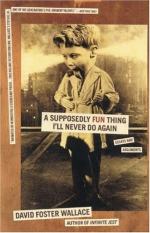|
This section contains 767 words (approx. 2 pages at 400 words per page) |

|
Rejection of Irony
In "E Unibus Pluram: Television and U.S. Fiction" Wallace argues that because it appeals to both the senses of vision and hearing it must employ a great deal of irony. Although Wallace believes that irony is in many ways entertaining, it also leads to detachment and despair and holds an iron grip on American culture. For instance, in order to appeal to customers, commercials must now show that they are ridiculous and make the audience believe they are on the inside of the joke instead of having the joke played upon them. This need to be in on the joke forces people to watch more and more television so that they do not miss any jokes. Whereas irony was originally used to attack outmoded values, it is now used to insult anyone who attempts to attack irony itself. Wallace believes that in order to unseat...
|
This section contains 767 words (approx. 2 pages at 400 words per page) |

|




